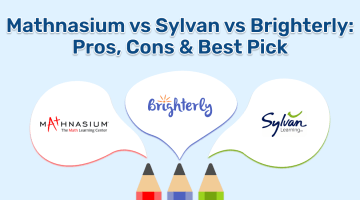Why Your Child Should Know Brain Games for Kids
Updated on May 7, 2024
Children today have lots of activities and games that help them be more creative, develop imagination, and keep them busy. However, these activities do not always work as they should. Brain games for kids can be a suitable option when the brain starts feeling overloaded with many stimuli. Such games challenge the brain in new ways, thus improving its working capacity.
Benefits of Brain Games for Kids
Brain games online for kids are a great way of keeping the brain sharp and healthy. They help to stimulate the mind and get it thinking. This benefit is vital for young children as it will help their development.
Here are some of the benefits of brain games for kids:
- Improve memory, focus, and attention levels
- Improve cognitive functions
- Enhance creativity, reasoning, logic, and planning skills
- Improve motor skills and coordination
- Help develop problem-solving skills
- Tone the brain, making it work more efficiently
- Increase the ability to concentrate better
- Increases the bond between you and your child if you are playing together
- Slow down age-related cognitive decline
- Improve visual processing speed
Math & Reading Camp
Join us to help your kid achieve
their full math and reading potential!
 Apply now
Apply now
16 Brain Games for Kids
Sudoku
Sudoku is among the most popular fun brain games. It is a great way to practice logical thinking and problem-solving. Sudoku helps children develop skills of pattern recognition and planning. Kids can play Sudoku with a pencil and paper or with an app. They will be able to choose different difficulty levels, like an easy, medium, hard, expert, and even evil one.
The objective of Sudoku is to fill the grid with the numbers 1 through 9 so that each row, column, and box contain each number only once and no spaces are left blank.
Chess
The chess game requires a lot of skill, strategy, and patience. It is also a great way to keep your brain working, especially when it comes to memory, concentration, and problem-solving skills.
Chess is one of the free brain games for kids. In chess, you need to remember the importance of each step, such as making a move at the correct time. Plus, you will have to think ahead to anticipate your opponent’s moves and plan the ways to counter them.
Chess is a fun game that can help kids learn new things about themselves and their brains’ abilities every time they play.
Rubik Cube
The Rubik cube is a 3 dimensional puzzle that Erno Rubik invented. It has six sides with nine stickers on each side. Each of the six sides is of a different color. Yellow, white, blue, green, orange, and red are the colors of the sides. The goal is to return all nine stickers to their original color on one side.
It is a game that will keep your brain active because you will have to twist the cube in various ways to get the colored tiles back in their original places.
Monopoly
Monopoly is a game about buying and selling properties. It is not surprising that one of the math skills it builds is related to money. Monopoly can help kids practice addition, subtraction, multiplication, and division.
It also allows them to learn how to read money amounts and recognize different coins and bills. Monopoly teaches the concept of probability by making players roll dice to move around the board.
Monopoly also requires that kids make decisions about spending money. The game is more fun if kids have enough cash on hand to buy property. However, they need to be careful not to spend all their money because they’ll need some leftovers to pay when they land on other players’ properties.
Crossword
A crossword is a word puzzle that usually takes the form of a square or a rectangular grid of white-and-black-shaded squares. This brain game for toddlers aims to fill the white squares with letters, forming words or phrases by solving clues that lead to the answers.
Typically, the answers should appear in the grid from left to right and from top to bottom. Shaded squares are used to separate the words. That is, shaded squares are employed to break up the text and help clarify where the words’ boundaries are located for the solver.
Sushi Monsters
It is one of the brain games for 5-year-olds whose aim is to have the highest number of points by the end of the game by collecting cards with correct answers. First, each player is dealt three sushi monster cards face down and picks one answer card (1-12) to flip over.
Players then use their knowledge of multiplication facts to find the product of their two numbers. Then participants search through their sushi monsters to find the one that matches their product. If they do not have it, they pass. Then they pick up another sushi monster card and try again until they find the one that matches or cannot match any of them on their next turn.
Ravensburger Labyrinth Game
The game’s objective is to collect all treasures by moving the pawn through the labyrinth. The goal is to reach each treasure before the three other players, which can be done by navigating through the twists and turns of the labyrinth.
Each player chooses a character token, each of which has a randomly matching treasure selected card. Players take turns moving the walls of the labyrinth to reach their treasure. Pawns move along passages, stepping over walls as they move until they run into another wall or back into a starting point.
Perplexus Epic Maze Game
Perplexus Epic Maze game contains 100 challenging barriers. It is among the best brain games for children. The game’s objective is to maneuver a small marble around challenging barriers inside a transparent sphere. It is easy to play but hard to master. You can tilt, flip, and twist the sphere but don’t drop the ball!
This game will test your skill, patience, and determination. The Perplexus Epix is a mind-bending marble maze where you can enjoy hours of challenging play as you navigate the ball along the numbered path.
Math & Reading Camp
Join us to help your kid achieve
their full math and reading potential!
 Apply now
Apply now
IQ Fit Brainteaser Puzzle
There are 40 challenges, and each challenge has a different level of difficulty ranging from 1 to 6 stars. The game has a play mode and a design model.
Kids can start the game in both modes. They are given a challenge in the play mode to be solved. In the design mode, one can create challenges by building castles with various shapes and pieces provided by the game.
Gamewright Rat-a-Tat Cat Card Game
The game teaches to build a timeless strategy and is ideal for children of all ages. The game’s objective is to make all five cards in your hand higher than the card on top of the deck. You make a series of matches that cause 1, 2, or 3 cards to advance up the track.
If you make 1 card advance up the track, you can continue to score, but later, cards that you match will be worthless points. If you make 2 cards advance up the track, you can continue to score, but later, cards that you match will be worth fewer points and cannot advance up the track. If you make 3 cards advance up the track, you win!
Melissa & Doug Suspend Family Game
The game is a great way to practice motor skills, improve hand-eye coordination, and interact with family members. The players must use a steady hand to place the 24 notched, rubber-tipped wire pieces on the tabletop stand. There are three different color wires of random lengths.
The longer the wire, the harder it is to balance. Each player turns laying down the wire pieces without falling over the whole structure. If it does, they get a letter. The first player to spell out S-U-S-P-E-N-D loses!
Apple Tree Game
It is one of the exciting brain games for kids online. Your Apple Tree Game is a fun way to play for points you can redeem for savings and prizes. To start, sign up for an account at MyPoints. In Apple Tree, you meet several choices of fruit. Make your choice and be instantly credited with points.
Open fruit for points and play until time runs out. Your best score is then turned into a tree that “grows” as more points are earned. Once your tree is fully grown, you can redeem the points from all your games for rewards! Rewards can range from gift cards to sporting goods, electronics, etc.
Dots and Boxes Game
You can play this game on a rectangular grid, using two different colors for the dots. A player gets awarded one point for each line segment drawn as it begins. Next, players can only draw horizontal or vertical lines.
Players can never copy the lines already drawn by the opponent. The player who draws the last line surrounding an empty rectangle wins that rectangle. Also, the player with more rectangles wins the game.
Gobblet Gobblers Game by Blue Orange Games
Gobblet Gobblers Game is a simple strategy game for children. You need to place your pieces on the three-by-three grid and win by getting three in a row. The pieces are called Gobblers and come in three sizes.
The smallest Gobbler can sit on the largest one, and so on. Only the biggest Gobbler can be seen.
You can move your Gobblers around the board both when it’s your turn and your opponent’s turn, but you cannot move them somewhere they would cover your opponent’s Gobbler. If you cover your opponent’s piece with yours, you get to keep that piece, too.
Hand-Slap Reaction Game
Hand-slap reaction game is a game run by one or more players (up to four). Each player has his/her own set of five buttons. The game begins with one player pressing any button.
A timer starts counting down from 3 seconds, and the other players must press their buttons as fast as possible while the timer is counting down. At the end of three seconds, the player who pressed their button first wins 1 point. The first player to get 10 points wins the game.
Rapid Fire
The game usually involves two teams of children, with the oldest child in each team starting the game. Children in one team take turns to say numbers in ascending order, while those in the other team do so in descending order.
Each team member says one number at a time until someone says a number that is either repeated or out of sequence. The team that gets ‘out’ loses and gives up one point to the other team. The winning team gets a chance to go again until it loses a turn. The game ends when a team has lost five turns, and the winning team is declared.
Conclusion
Brain games for children provide countless benefits to all areas of a child’s development, from motor skills to cognitive and language skills. Playing online brain games for children can keep your child’s minds engaged when school is out of session during the summer months. The best part is that most brain games are free!












